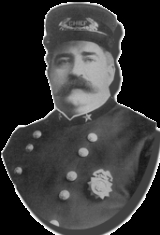
William S. Devery
Encyclopedia
William Stephen Devery (January 9, 1854 – June 20, 1919) was the last superintendent of the New York City Police Department
police commission and the first police chief in 1898.
in 1854. In 1878, at age 24, he was hired as a patrolman. On September 16, 1881, he was made a roundsman, and on May 28, 1884, he was promoted to a sergeant. On December 30, 1891, after 13 years on the force, he was promoted to captain. On February 5, 1897 as a captain, he was arrested and charged for bribery and extortion. After conviction, he was dismissed from the force. He appealed his conviction to the New York State Court of Appeals. It was overturned and he was reinstated to the force and promoted to inspector on January 7, 1898, and Deputy Chief on February 14, 1898. He was then appointed Chief of Police on June 30, 1898.
In 1899, Theodore Roosevelt
and Republican state legislators established a committee, headed by Robert Mazet, to investigate Tammany Hall
corruption under the leadership of Richard Croker
.
As a police captain he once told his men, "They tell me there's a lot of grafting going on in this precinct. They tell me that you fellows are the fiercest ever on graft. Now that's going to stop! If there's any grafting to be done, I'll do it. Leave it to me."
Lincoln Steffens, a popular journalist of that time wrote of Devery, "As a Chief of Police, he is a disgrace, but as a character, he is a work of art." The superintendent of the police commission title was changed to chief of police in 1898.
Later with Frank J. Farrell
, he bought the Baltimore, Maryland baseball team and moved it to New York and renamed it the Highlanders. The team almost won the American League pennant in 1904, but otherwise had poor records during the Farrell-Devery ownership era. For $300K, they sold the team in 1915 to Jacob Ruppert, Jr. and Tillinghast L' Hommedieu Huston.
He died on June 20, 1919 at 4:15 p.m. of apoplexy
in Far Rockaway, New York.
New York City Police Department
The New York City Police Department , established in 1845, is currently the largest municipal police force in the United States, with primary responsibilities in law enforcement and investigation within the five boroughs of New York City...
police commission and the first police chief in 1898.
Biography
He was born in New York CityNew York City
New York is the most populous city in the United States and the center of the New York Metropolitan Area, one of the most populous metropolitan areas in the world. New York exerts a significant impact upon global commerce, finance, media, art, fashion, research, technology, education, and...
in 1854. In 1878, at age 24, he was hired as a patrolman. On September 16, 1881, he was made a roundsman, and on May 28, 1884, he was promoted to a sergeant. On December 30, 1891, after 13 years on the force, he was promoted to captain. On February 5, 1897 as a captain, he was arrested and charged for bribery and extortion. After conviction, he was dismissed from the force. He appealed his conviction to the New York State Court of Appeals. It was overturned and he was reinstated to the force and promoted to inspector on January 7, 1898, and Deputy Chief on February 14, 1898. He was then appointed Chief of Police on June 30, 1898.
In 1899, Theodore Roosevelt
Theodore Roosevelt
Theodore "Teddy" Roosevelt was the 26th President of the United States . He is noted for his exuberant personality, range of interests and achievements, and his leadership of the Progressive Movement, as well as his "cowboy" persona and robust masculinity...
and Republican state legislators established a committee, headed by Robert Mazet, to investigate Tammany Hall
Tammany Hall
Tammany Hall, also known as the Society of St. Tammany, the Sons of St. Tammany, or the Columbian Order, was a New York political organization founded in 1786 and incorporated on May 12, 1789 as the Tammany Society...
corruption under the leadership of Richard Croker
Richard Croker
Richard Croker, Sr. was an American politician, a leader of New York City's Tammany Hall.-Biography:...
.
As a police captain he once told his men, "They tell me there's a lot of grafting going on in this precinct. They tell me that you fellows are the fiercest ever on graft. Now that's going to stop! If there's any grafting to be done, I'll do it. Leave it to me."
Lincoln Steffens, a popular journalist of that time wrote of Devery, "As a Chief of Police, he is a disgrace, but as a character, he is a work of art." The superintendent of the police commission title was changed to chief of police in 1898.
Later with Frank J. Farrell
Frank J. Farrell
Frank J. Farrell with William S. Devery were the first owners of the New York Highlanders . They purchased the Baltimore Orioles on January 9, 1903 for $18,000 and moved it to New York City....
, he bought the Baltimore, Maryland baseball team and moved it to New York and renamed it the Highlanders. The team almost won the American League pennant in 1904, but otherwise had poor records during the Farrell-Devery ownership era. For $300K, they sold the team in 1915 to Jacob Ruppert, Jr. and Tillinghast L' Hommedieu Huston.
He died on June 20, 1919 at 4:15 p.m. of apoplexy
Apoplexy
Apoplexy is a medical term, which can be used to describe 'bleeding' in a stroke . Without further specification, it is rather outdated in use. Today it is used only for specific conditions, such as pituitary apoplexy and ovarian apoplexy. In common speech, it is used non-medically to mean a state...
in Far Rockaway, New York.

